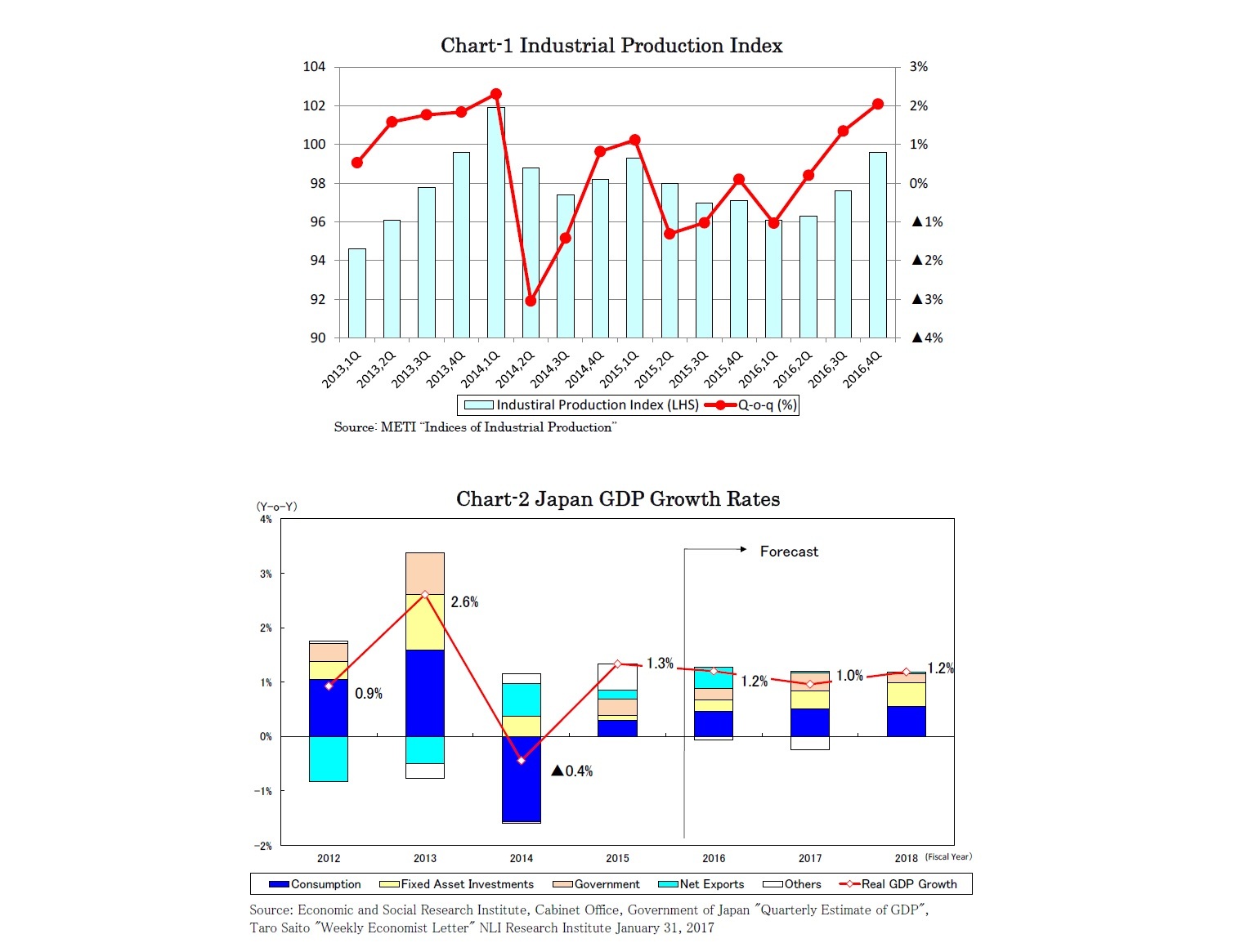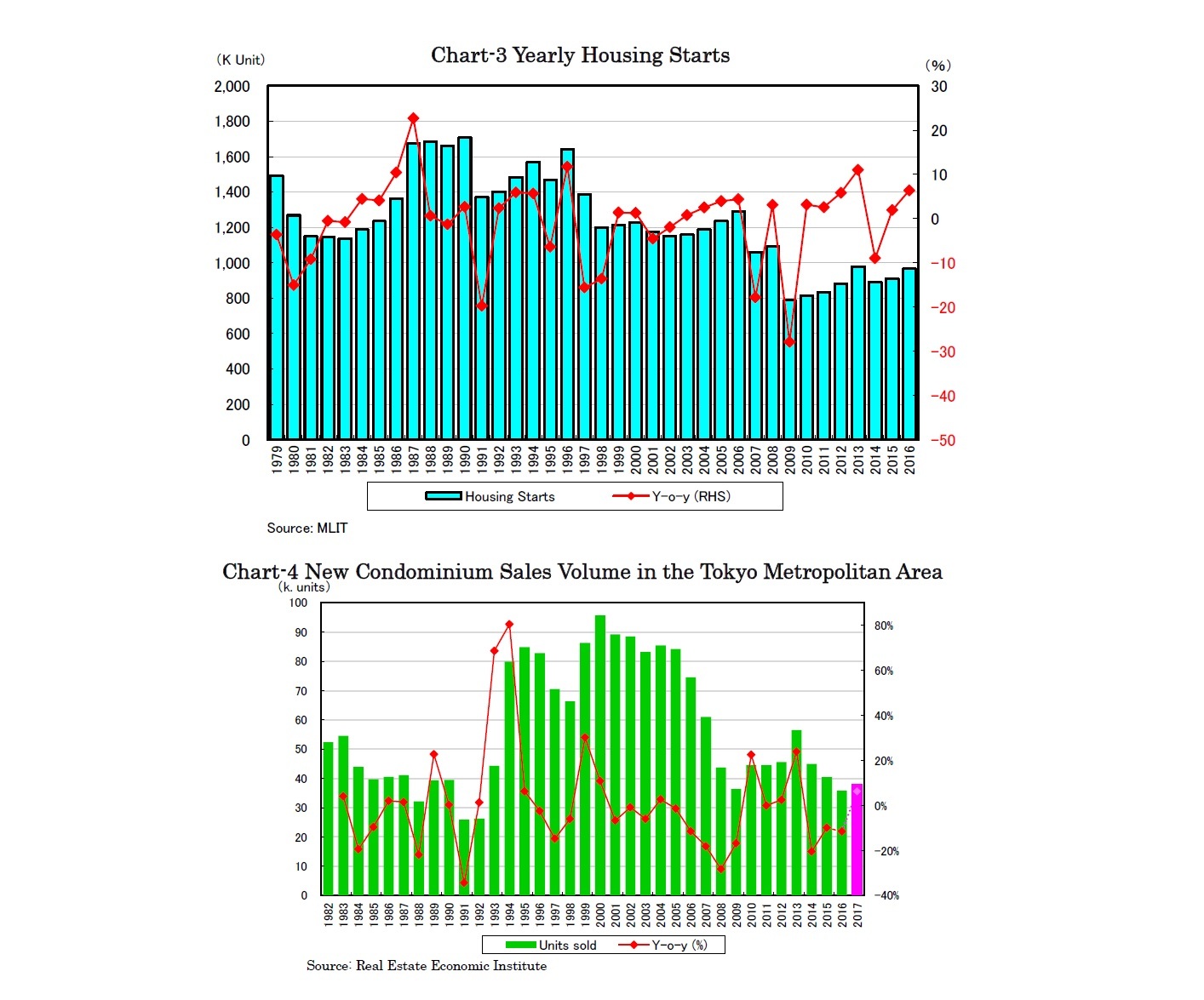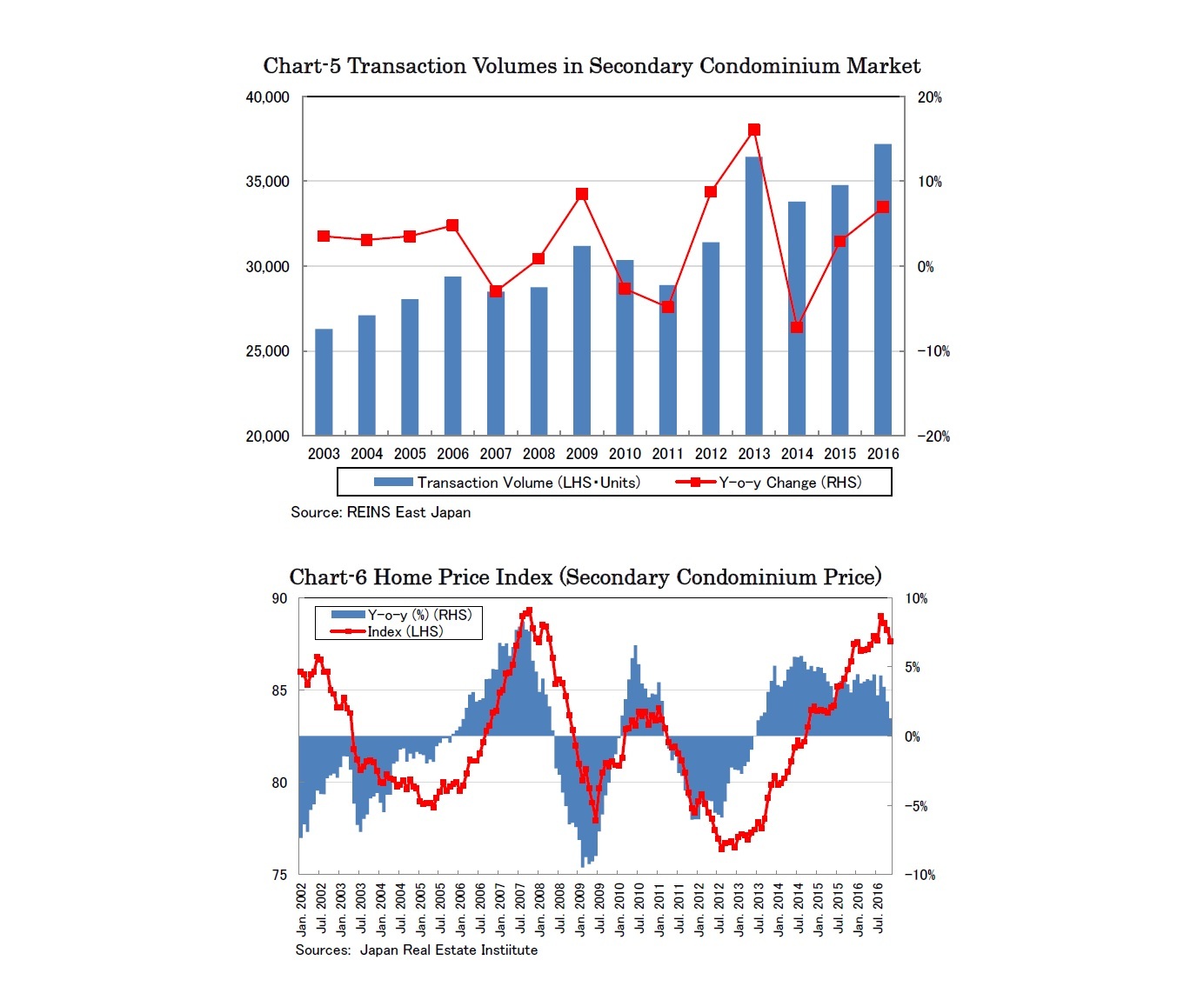- NLI Research Institute >
- Real estate >
- Japanese Property Market Quarterly Review, Fourth Quarter 2016-J-REITs Appreciate by 6% and Record Third Largest Yearly Acquisition Amount in 2016-
06/02/2017
Japanese Property Market Quarterly Review, Fourth Quarter 2016-J-REITs Appreciate by 6% and Record Third Largest Yearly Acquisition Amount in 2016-
Financial Research Department Economic Research Department Researcher Hiroto Iwasa
Font size
- S
- M
- L
1.Economy and Housing Market
While Japan’s GDP growth rate was revised down to 1.3% q-o-q in the third quarter, private consumption is expected to recover supported by better employment conditions and private capital expenditure is also expected to recover hereafter.
According to METI, the industrial production index rose by 2.0% q-o-q for the third consecutive quarter (Chart-1), posting as high a growth as in the first quarter in 2014 when the index was lifted by the rush in demand before the consumption tax hike.
NLI Research Institute revised up its forecasts of GDP growth rates in December to +1.2%, +1.0% and +1.2% y-o-y for 2016, 2017 and 2018, respectively (Chart-2).
According to METI, the industrial production index rose by 2.0% q-o-q for the third consecutive quarter (Chart-1), posting as high a growth as in the first quarter in 2014 when the index was lifted by the rush in demand before the consumption tax hike.
NLI Research Institute revised up its forecasts of GDP growth rates in December to +1.2%, +1.0% and +1.2% y-o-y for 2016, 2017 and 2018, respectively (Chart-2).
The housing market has mostly been steady excluding new condominium sales. Housing starts grew by 3.9% y-o-y to 78,406 units in December for the sixth consecutive month of positive growth, and by 6.4% y-o-y to 967k units for the whole year 2016. Housing starts of apartments for lease grew by 10.5% y-o-y for the fifth consecutive year of positive growth, accounting for 40% of total housing starts.
New condominium sales volume in the Tokyo metropolitan area decreased by 11.6% y-o-y to 35,772 units in 2016, particularly declining by more than 20% in Tokyo. While the average unit price declined by 0.5% y-o-y to 54.9 million JPY, price per square meter still appreciated by 1.8% y-o-y to 793k JPY for the fourth consecutive year. Real Estate Economic Institute forecasts a 6.2% y-o-y increase of sales volume to 38,000 units in 2017 (Chart-4).
According to Real Estate Information Network Systems, the transaction volume in the secondary condominium market in the Tokyo metropolitan area increased by 11.1% y-o-y to 9,317 units in the fourth quarter and by 6.9% to 37.2k units, the largest ever, in 2016 (Chart-5), outnumbering the new condominium sales volume for the first time. The average transaction price rose by 5.4% y-o-y to 30.5 million JPY for the fourth consecutive year of appreciation.
However, housing prices have shown some weakness recently, as Japan Real Estate Institute’s “Home Price Index,” the secondary condominium price index in the Tokyo metropolitan area, has declined for the third consecutive month (Chart-6).
It is of concern that rising bond yields and strengthened regulatory measures will lift mortgage rates, and the tax authority is reviewing inheritance tax conditions to prevent luxury condominiums from being abused to minimize taxable bases.
New condominium sales volume in the Tokyo metropolitan area decreased by 11.6% y-o-y to 35,772 units in 2016, particularly declining by more than 20% in Tokyo. While the average unit price declined by 0.5% y-o-y to 54.9 million JPY, price per square meter still appreciated by 1.8% y-o-y to 793k JPY for the fourth consecutive year. Real Estate Economic Institute forecasts a 6.2% y-o-y increase of sales volume to 38,000 units in 2017 (Chart-4).
According to Real Estate Information Network Systems, the transaction volume in the secondary condominium market in the Tokyo metropolitan area increased by 11.1% y-o-y to 9,317 units in the fourth quarter and by 6.9% to 37.2k units, the largest ever, in 2016 (Chart-5), outnumbering the new condominium sales volume for the first time. The average transaction price rose by 5.4% y-o-y to 30.5 million JPY for the fourth consecutive year of appreciation.
However, housing prices have shown some weakness recently, as Japan Real Estate Institute’s “Home Price Index,” the secondary condominium price index in the Tokyo metropolitan area, has declined for the third consecutive month (Chart-6).
It is of concern that rising bond yields and strengthened regulatory measures will lift mortgage rates, and the tax authority is reviewing inheritance tax conditions to prevent luxury condominiums from being abused to minimize taxable bases.

03-3512-1858
Social media account
レポート紹介
-
研究領域
-
経済
-
金融・為替
-
資産運用・資産形成
-
年金
-
社会保障制度
-
保険
-
不動産
-
経営・ビジネス
-
暮らし
-
ジェロントロジー(高齢社会総合研究)
-
医療・介護・健康・ヘルスケア
-
政策提言
-
-
注目テーマ・キーワード
-
統計・指標・重要イベント
-
媒体
- アクセスランキング




















